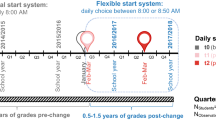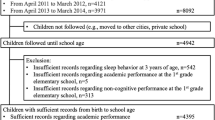Abstract
Background
The aim of this study was to investigate the relationship between sleep duration, wake time, and hours studying on high school grades and performance on the Scholastic Aptitude Test (SAT)/ American College Testing (ACT) college entrance exams.
Method
Data were collected from 13,071 recently graduated high school seniors who were entering college in the fall of 2014. A column proportions z test with a Bonferroni adjustment was used to analyze proportional differences. Analysis of covariance (ANCOVA) was used to examine mean group differences.
Results
Students who woke up prior to 6 a.m. and got less than 8 h of sleep (27 %) were significantly more likely to report studying 11 or more hours per week (30 %), almost double the rate compared to students who got more than 8 h of sleep and woke up the latest (16 %). Post hoc results revealed students who woke up at 7 a.m. or later reported significantly higher high school grades than all other groups (p < 0.001), with the exception of those students who woke up between 6:01 a.m. and 7:00 a.m. and got eight or more hours of sleep. The highest reported SAT/ACT scores were from the group that woke up after 7 a.m. but got less than 8 h sleep (M = 1099.5). Their scores were significantly higher than all other groups.
Conclusion
This study provides additional evidence that increased sleep and later wake time are associated with increased high school grades. However, this study also found that students who sleep the longest also reported less studying and lower SAT/ACT scores.
Similar content being viewed by others

References
Owens J, Adolescent Sleep Working Group, Committee on Adolescence (2014) Insufficient sleep in adolescents and young adults: an update on causes and consequences. Pediatrics 134:e921–e932
Wolfson AR, Carskadon MA (2003) Understanding adolescent’s sleep patterns and school performance: a critical appraisal. Sleep Med Rev 7:491–506
Wolfson AR, Spaulding NL, Dandrow C, Baroni EM (2007) Middle school start times: the importance of a good night’s sleep for young adolescents. Behav Sleep Med 5:194–209
Owens JA, Belon BA, Moss P (2010) Impact of delaying school start time on adolescent sleep, mood, and behavior. Arch Pediatr Adolesc Med 164:608–614
Bailly D, Bailly-Lambin I, Querlau D, Beuscart R, Collinet C (2004) Sleep in adolescents and its disorders: a survey in schools. L’Encéphale 30:352–359
Haynes PL, Bootzin RR, Smith L, Cousins J, Cameron M, Stevens S (2006) Sleep and aggression in substance-abusing adolescents: results from an integrative behavioral sleep treatment pilot program. Sleep 29:512–520
Wahlstrom KL (2002) Accommodating the sleep patterns of adolescents within current educational structures: an uncharted path. Adolescent sleep patterns: biological, social, and psychological influences 172–197
National Sleep Foundation (2006) Teens and sleep. Sleep in America Polls. Washington, DC: Available at: www.sleepfoundation.org/article/sleep-america-polls/2006-teens-and-sleep. Accessed November 3, 2015
Taylor DJ, Vatthauer KE, Bramoweth AD, Ruggero C, Raone B (2013) The role of sleep in predicting college academic performance: is it a unique predictor? Behav Sleep Med 11:159–172
Hinrichs P (2011) When the bell tolls: the effects of school starting times on academic achievement. Educ Fin & Pol 6:486–507
Liu X, Liu L, Owens JA, Kaplan DL (2005) Sleep patterns and sleep problems among schoolchildren in the United States and Canada. Pediatrics 115(1 Supplement):241–249
Gillen-O’Neel C, Huynh VW, Fuligni AJ (2013) To study or to sleep? The academic costs of extra studying at the expense of sleep. Child Dev 84:133–142
Cooper H, Robinson JC, Patall EA (2006) Does homework improve academic achievement? A synthesis of research, 1987-2003. Rev of Ed Res 76:1–62
Hirshkowitz M et al. (2015) National Sleep Foundation’s updated sleep duration recommendations: final report. Sleep Health. doi:10.1016/j.sleh.2015.10.004
College Board (2009) SAT-ACT concordance tables. Research Notes, 40. http://research.collegeboard.org/sites/default/files/publications/2012/7/researchnote-2009-40-act-sat-concordance-tables.pdf. Accessed 1 Nov 2015
Cole JS, Gonyea RM (2010) Accuracy of self-reported SAT and ACT scores: implications for research. Res High Educ 51:305–319
Author information
Authors and Affiliations
Corresponding author
Ethics declarations
Funding
No funding was received for this research.
Conflict of interest
The author declares that he has no conflict of interest.
Ethical approval
All procedures performed in studies involving human participants were in accordance with the ethical standards of the institutional and/or national research committee and with the 1964 Helsinki declaration and its later amendments or comparable ethical standards.
Informed consent
Informed consent was obtained from all individual participants included in the study.
Rights and permissions
About this article
Cite this article
Cole, J.S. Do later wake times and increased sleep duration of 12th graders result in more studying, higher grades, and improved SAT/ACT test scores?. Sleep Breath 20, 1053–1057 (2016). https://doi.org/10.1007/s11325-016-1341-0
Received:
Revised:
Accepted:
Published:
Issue Date:
DOI: https://doi.org/10.1007/s11325-016-1341-0



